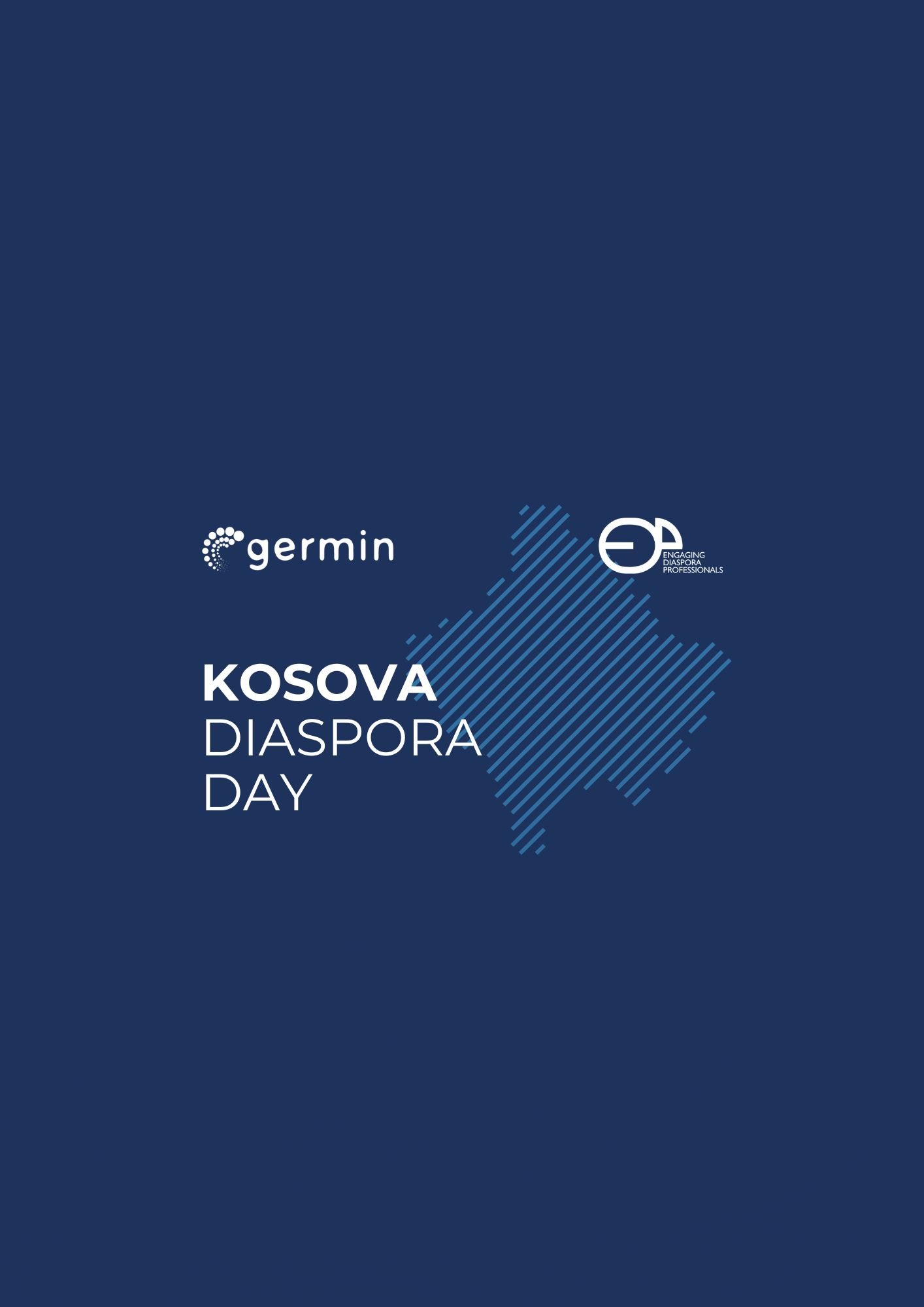Written by: Arieta Dragusha
In a globally connected world where information and communication spread rapidly, advocacy and digital diplomacy have become essential tools, especially for small states like Kosovo. The role of the diaspora in these processes goes beyond symbolic support, becoming a key force in promoting national interests, strengthening international relations, and encouraging development policies. With millions of Albanians spread worldwide, the diaspora represents a largely untapped potential to influence decision-making and contribute to Kosovo’s transformation.
This article, based on discussions held during the roundtable “Advocacy and Public Diplomacy of the Diaspora” organized by Germin in December 2024, analyzes the evolution of advocacy and digital diplomacy, the concrete impact of the diaspora on Kosovo’s politics and economy, as well as challenges and recommendations to maximize this impact. The goal is to highlight how technology, policy, and civic engagement can come together to create an effective strategy that positions Kosovo more strongly on the international stage.
Digital Diplomacy and the Transformation of Advocacy
Over the last decade, the internet and digital platforms have opened new horizons for advocacy and diplomacy. In the past, diplomacy was an exclusive field of state institutions, but today the diaspora has the opportunity to directly influence international policies through strategic use of social media and coordinated campaigns. These platforms have facilitated the creation of networks with professionals who shape opinions about Kosovo, making the diaspora an important actor in building the country’s global narrative.
During the roundtable, Behar Xharra – co-founder of Germin – shared his story about the beginnings of digital diplomacy in Kosovo, emphasizing how in 2010, when Kosovo was still a new state, its online image was dominated by negative stories – war, politics, and state-building challenges. He stressed that diplomacy was turning into a digital space and that it was essential to act as digital citizens to change this narrative.
Xharra explained that Kosovo had a diaspora as an unused diplomatic capital – individuals who speak foreign languages, are voters in their resident countries, and influence their communities. To overturn the negative narrative, he and his team created KosovoDiaspora, a blog dedicated to promoting success stories from the diaspora and building a positive image of Kosovo internationally.
Working with the diaspora, they realized its potential remained unused in Kosovo’s development. This led to the founding of Germin as a platform aimed at strategically empowering and engaging the diaspora in the country’s development processes.
Beyond promoting Kosovo’s image, Xharra highlighted that digital diplomacy has enabled the diaspora not only to challenge inaccurate narratives but also to protect its interests and highlight success stories that position Kosovo as a relevant player in the region. This new approach has transformed how Kosovo and its diaspora interact with the world, making the diaspora a key actor in the country’s public diplomacy.
There are many success stories of Kosovars living abroad who have achieved in business, media, art, sports, and even politics. Utilizing and strengthening their social status abroad, as well as opportunities for public engagement as informal ambassadors and public faces of Kosovo, in a coordinated and strategic way, can make a great contribution to Kosovo’s public diplomacy efforts. [Beyond Remittances PUBLIC DIPLOMACY AND KOSOVO‘S DIASPORA, Behar Xharra and Martin Wählisch, 2012, pg. 34]
Integration of the Diaspora in Policy Making
In many countries, the diaspora has played a key role in supporting policy making and institutional reforms. Kosovo should not be an exception. Through various projects, Kosovar diaspora experts can contribute concretely to legal reforms, economic strategies, and sector development. [The Ministry of Foreign Affairs and Diaspora already has an engagement program for diaspora professionals, aiming to connect them by offering space and opportunities for involvement in MPJD. This six-month program allows diaspora professionals to exchange knowledge and experience within public diplomacy, focusing on diaspora diplomacy, civic diplomacy, and economic diplomacy – www.cdfellowship.com]. Involving professionals with international experience in decision-making mechanisms brings new knowledge and helps create policies aligned with international standards. Germin has a wide and very effective network of various professionals who can contribute and engage both in civil society and in domestic institutions. [Program – Engaging Professionals from the Diaspora (EDP)]
Sports Diplomacy as a Tool of Advocacy
Sport is one of the most powerful mechanisms for building international relations and promoting a positive image of a country. Kosovo, through its successful athletes, has gained recognition and respect on the international stage. Athletes manage to penetrate international markets and build bridges beyond politics. Furthermore, Kosovo’s success in sports has also helped promote gender equality and social inclusion, as Elvira Dushku, Secretary General of the Basketball Federation of Kosovo, noted, which is reflected in the composition of this federation.
Xherdan Shaqiri and Granit Xhaka are considered among the best footballers from the country. Another player of Kosovar origin, Fatmire Bajramaj, part of the German women’s football team, was nominated as FIFA Player of the Year in 2010, an award given to the world’s best female footballer. [Beyond Remittances … pg. 66]
The Role of Economic and Social Diplomacy
Beyond traditional diplomacy and advocacy on digital platforms, the Albanian diaspora has a significant economic impact. During the recent roundtable, Bahri Cani, a journalist at Deutsche Welle, emphasized the contribution of businesses run by Albanians in the diaspora, which employ a large number of workers and help promote international connections. These businesses not only create jobs and develop international trade but also improve the global perception of Kosovo and Albania, giving a practical dimension to economic diplomacy.
Direct investments from the diaspora, building business connections, and knowledge transfer are key elements that can contribute to more sustainable economic development. For this reason, it is important that these initiatives become institutionalized and supported by government policies and cooperation platforms.
Social and Philanthropic Impact
The Albanian diaspora is one of the most active communities in terms of philanthropy. Through remittances, it has been a support pillar for the economies of Kosovo and Albania. However, its impact can go beyond financial aid by including initiatives that empower the health, education, and social inclusion sectors. In this context, Germin has played an important role in mobilizing these resources, creating mechanisms that channel diaspora contributions toward the economic and social development of Kosovo and Albania. [Program – Engaging Diaspora Professionals, Germin]. Through various projects, Germin has connected diaspora professionals with local institutions, creating platforms for exchanging expertise and investments.
Contribution to Knowledge Transfer
One of the most important aspects of diaspora engagement is the transfer of knowledge and expertise. Germin promotes the transfer of knowledge and skills from the diaspora to Kosovo through professional networks and collaborative platforms. So far, over 100 professionals from different fields have contributed through mentoring and professional engagement, while over 500 others are registered on Germin’s online platform. Through different projects, Germin empowers women in politics, connects diaspora investors and entrepreneurs with key economic sectors, and helps NGOs in Kosovo address the lack of expertise. These initiatives not only strengthen ties with the diaspora but also contribute to the country’s socio-economic development.
Challenges of Diaspora Engagement in Public and Digital Diplomacy
One of the biggest challenges hindering effective diaspora involvement in Kosovo’s development is the lack of a clear and coordinated strategy. [Needs Analysis and Identification of Kosovo Diaspora Problems, Germin 2024, p. 10]. Although many individual initiatives and separate projects exist, there is still no centralized and institutionalized mechanism to guide and structure diaspora contributions in a sustainable and long-term way. This lack of strategy often makes it difficult to maximize diaspora impact, as its engagements remain fragmented and limited to isolated initiatives without an integrated approach.
Another major obstacle is the institutional and bureaucratic barriers the diaspora faces when trying to engage in projects or invest in Kosovo. Complex administrative processes, lack of legal facilitation, and often unclear procedures discourage many diaspora professionals and investors from deeper involvement. [Harnessing the Potential of the KOSOVAR DIASPORA’S ECONOMIC CONTRIBUTIONS, Germin 2024, p. 45] These bureaucratic challenges not only hinder active diaspora engagement but also damage its perception of the opportunities the state offers to contribute to the country’s development.
Another important problem remains the lack of coordination among different actors working with and for the diaspora. Various civil society organizations, state institutions, and diaspora groups often operate independently and without structured cooperation. This dispersion of efforts leads to lack of synergy and reduces the possible impact the diaspora could have through a unified and well-planned approach. Without an effective cooperation and coordination mechanism, much of the diaspora’s potential remains untapped.
Besides internal challenges, an important issue remains how Kosovo is perceived internationally. Although significant progress has been made in strengthening public diplomacy and promoting Kosovo as a developing country with high potential, its global image still faces challenges. The international narrative about Kosovo is often dominated by political issues rather than its achievements in areas like innovation, economy, or diaspora inclusion. Therefore, a more strategic approach to international advocacy is necessary, one that not only defends Kosovo’s interests but also redefines how the country is presented in the eyes of the international community.
Conclusions and Recommendations
Advocacy and digital diplomacy of the diaspora represent powerful tools to influence Kosovo’s development and strengthen its position on the international stage. Technology, expertise, and global diaspora networks can serve as catalysts for building sustainable policies, improving the country’s image, and empowering public diplomacy.
To fully utilize this potential, a clear and well-coordinated strategy among state institutions, the private sector, and the diaspora itself is essential. Institutionalizing diaspora engagement and the strategic use of digital diplomacy can position Kosovo as a stronger actor on the global scene. By channeling the energy and capacities of the diaspora toward tangible change and innovation, Kosovo can secure a more active and sustainable role in its national and international development.
To maximize the diaspora’s impact and turn it into a key factor in Kosovo’s development, institutionalizing its inclusion in a sustainable and long-term manner is essential. The Kosovo government should create a dedicated platform to coordinate the engagement of diaspora experts in policy making and development projects. This platform should function as a bridge between public institutions, the private sector, and diaspora professionals, ensuring a clear mechanism for identifying needs and involving international expertise in Kosovo’s decision-making processes.
Furthermore, increasing cooperation with international organizations is a necessary step to ensure that diaspora engagement becomes part of the country’s development strategies. By linking the diaspora with institutions and global networks, Kosovo can benefit from the knowledge, experiences, and international contacts of its professionals. This would help in knowledge transfer, easing new employment and investment opportunities, and creating sustainable partnerships in areas like innovation, technology, and education.
Another key aspect is easing diaspora investments, which would encourage its economic engagement in Kosovo. Creating clear legal and administrative mechanisms for diaspora investors is a necessity to foster more development projects and reduce barriers that often prevent investments. Reforming business registration procedures, providing financial support for investors, and ensuring a favorable investment environment would make Kosovo a more attractive destination for diaspora capital.
Finally, developing digital diplomacy as a state strategy is a crucial step to improve Kosovo’s international image and promote its interests worldwide. The government and civil society organizations should invest in training, platforms, and structured campaigns that strengthen the capacity of institutions and citizens to use digital tools in advocacy and public diplomacy. Through a more
strategic and coordinated approach, Kosovo can strengthen its presence on the international stage, influence global perceptions, and secure greater support for its issues internationally.
This article was produced with support from the regional project “SMART Balkans – Civil Society for Common Values in the Western Balkans,” implemented by the Center for the Promotion of Civil Society (CPCD) in cooperation with the Institute for Democracy and Mediation (IDM) and the Center for Research and Policy Making (CRPM), with financial support from the Norwegian Ministry of Foreign Affairs (NMFA). The content is the sole responsibility of Germin as the project implementer and does not necessarily reflect the views of the Norwegian Ministry of Foreign Affairs (NMFA).



